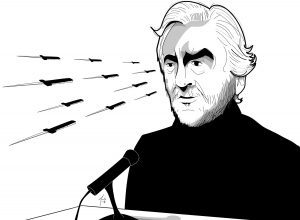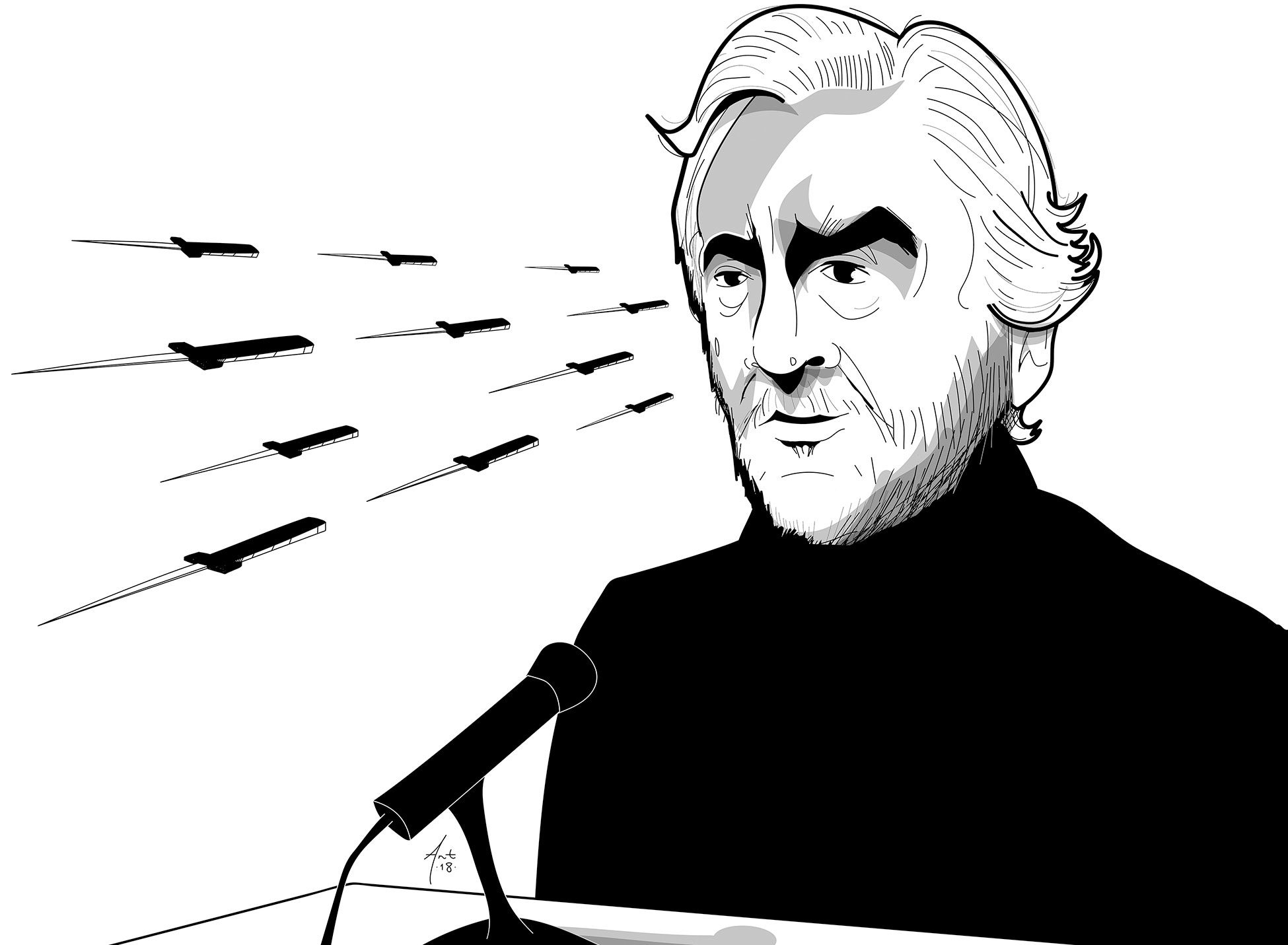
De Niro.
Downey Jr.
Pattinson.
These three Roberts share a dramatic experience: They have all walked out during a media interview.
In 2015, De Niro exited a recording with Radio Times in Britain after claiming the journalist asked him questions with “negative inference.” Pattinson was guided from a conversation with Ryan Seacrest after he was pressed about his relationship with Twilight co-star Kristen Stewart in 2009. Downey Jr., in a tantrum nearly as temperamental as his behaviour during the 1990s, called British journalist Krishnan Guru-Murthy a “bottom-feeding muckraker” during an interview with Howard Stern in 2015.
“You never know what you’re heading into,” says Eli Glasner, an entertainment reporter and film critic for CBC. “You can do all the preparation in the world and then people can just be in a mood.”
While the journalists who survived the experiences above did so with their limbs intact, it’s their reputations among Hollywood’s PR and celebrity elite that may suffer after what is perceived to be a disrespectful encounter. And the A-list celebrity can be an unpredictable beast. Johanna Schneller, a film columnist for The Globe and Mail, knows interview risks all too well: After a session with Julia Roberts for GQ, Schneller was told she was not allowed to interview her again.
“If [a celebrity gets] to be super famous, they have what they call ‘writer approval.’ They can say, no,” Schneller says. “[Roberts] didn’t like what I wrote about her, but I thought it was fair. I don’t want to have to write only nice things. I want to be free to write what I see and what I’ve observed and what I feel to be the truth of our encounter, and I think that means being fair but also that means people aren’t going to like you.”
Celebrities are the lions of show business, a spectacle to reporters who operate as safari hunters, observing from afar, sometimes really up close. While journalists can only hope to survive each encounter, there are suggested rules to follow if the ultimate goal is to get readers, listeners and viewers the most engaging stories possible.
Rule #1:
Don’t Tell Them Your Questions In Advance
Steven Banks, a producer for Entertainment Tonight Canada, has endured celebrity interviews on various occasions. “When you show questions in advance, first of all, it’s easy for a publicist to say no, no, no and no,” he explains. “That throwing-off moment [from an unexpected question] might elicit or catch different responses than what you’re expecting.”
According to Glasner, using only pre-approved questions “just makes for a less interesting interview. If you know exactly what you’re going to be asked before it starts, then you start preparing your answer and rehearsing it, and then it’s just not as spontaneous.”
Glasner believes that in order to survive an encounter with celebrities, the subject mustn’t be aware of the moves you’re about to make. “They’re dying to be asked something interesting,” he continues. “Anything you can do to give them an opportunity to be themselves or share something special—most people will actually appreciate that.”
Rule #2:
Do Deep Research
“I find when interviewing a celebrity, it helps to do your homework,” says Chris Knight, chief film critic at the National Post. “Read the press notes, hit up IMDB, do some research, [and] even watch some of their movies,” he adds. “The more you know about them, the better you’ll be able to talk to them.”
In late 2017, Marni Weisz, the editor of Cineplex Magazine, was scheduled to interview Star Wars actor Mark Hamill. A few days prior, she was scrolling through his Twitter account when she found a thread about Prime Minister Justin Trudeau wearing Chewbacca socks, which became a fun part of her interview with Hamill.
“Know the things that you should know going in,” Weisz says. “One of the most important things in overcoming any nervousness is research, research, research.”
Glasner agrees. In 2013, during the promotion of the film Labor Day, Glasner interviewed filmmaker Jason Reitman, who directed the movie. There was a certain prop in the movie that caught Glasner’s attention—a hand-held arcade console Donkey Kong tabletop game. Glasner remembered playing the same one growing up, and, thinking it would be a great introduction, he brought it into the interview.
“I reveal it, and he goes: ‘Oh, my God—it’s the thing!’ And then he starts telling me this story about how he had to have that specific game, and how it was really hard to buy, and they went onto eBay to find it. It was the perfect segue into where I wanted to go,” he says. “So if you do your research, and you see an opening, and there’s something—and it doesn’t have to be that dramatic. When it works, it’s a beautiful thing.”
Rule #3:
Build A Connection
In some cases, Glasner explains, the well-trained celebrity will initiate a connection in order to improve the interview. This belief rang true during an encounter with Dwayne Johnson, who, prior to sitting down with Glasner, told him that he liked his watch.
“It’s not a very good watch,” Glasner recalls, “but it kind of sets a nice tone.”
While producing quality interviews is something all journalists strive for, Knight warns that though it’s important to have a connection, it’s also important not to get too tied up in it: “I’ve had many nice chats with Jessica Chastain and with Sarah Polley, but I think I can still be fair to their work.”
Not every interview is going to be a good one. During the 2016 Emmy Awards, Zulekha Nathoo, a CBC entertainment reporter, was working on the red carpet when she asked Game of Thrones actress Sophie Turner how she felt about three actresses from the show receiving nominations in the same category. Turns out, Turner wasn’t one of them. Accepting Nathoo’s apologies, Turner laughed it off.
“It sucks at the time, but at the end of the day it’s an experience that everyone has at some point and it’s definitely educational,” says Meaghan Wray, a digital editor for Hello! Canada. She experienced the same embarrassment while working as a culture intern at Flare, asking a comedian an unwelcome question that led to the interview being cut short. “It makes you grow a tougher skin and, in a way, kind of equalizes you. You realize that celebrities are just normal people, too, and it kind of lights a fire under your ass.”
Rule #4:
Don’t Get Too Fancy
During promotional tours, most celebrities just want people to see their movie, buy their album or watch their show. This often leaves journalists grasping to get unique interviews, and coming up with absurd ways in order to do so.
In an article for The Guardian, journalist Chris Stark wrote about an encounter with actress Emma Thompson, who he interviewed at a press junket. Overhearing someone say that Thompson spoke French, he attempted to be different—asking her questions in the language as a way to be creative. Unfortunately—yet, a little expectedly—it didn’t go as planned. Rather than using the interview to learn more about Thompson’s personal life, Stark spent the few allotted minutes he had speaking a language he barely knew while an “angry PR lady” glared at him.
“I think it’s a temptation to try and like—you know, you want to feel like you’re an equal,” says Glasner. “You want to say, ‘I’m cool just like you’ or ‘I get it.’”
The time one wastes trying to impress them, Glasner says, is time that could be spent getting a more informative interview.
“Even if you do know something, people make the mistake of showing how smart they are as an interviewer, showing how much they know, and what that means is that you’re sort of closing the door to any questions,” says Schneller.
Rule #5:
Treat Them As Human Beings
“If you realize that, at the core of this,” says Banks, “you’re sitting down with another human being—you’re sitting down with somebody who has probably the same issue that you might have, although they might have a lot more money in their bank account—they connect through emotions.”
Volunteering information about your personal life, Schneller says, can help. “If I’m asking them about their divorce, I say that my parents were divorced so they know I’m not judging them. So my way of establishing a connection is more about just showing them that I’m there for them, that I’m interested in them, and that I want to bring out the best in them, even if sometimes the best is challenging. That’s sort of my style.”
According to Weisz, celebrities are “just people.” She shrugs her shoulders, as if it’s the simplest truth in the world: “Treat them the same as anyone else. You’re both going in with a job to do, and you’re equals.”
